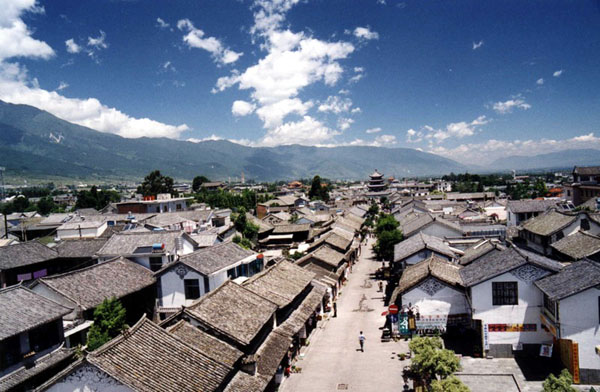Dali, locally distinguished by its former name “Xiaguan”, is one of the most popular tourist destinations in Yunnan Province. Located between the Cangshan Range to the west and the Erhai Lake to the east, this old town is well-known for its rural scenery, historical and cultural heritage. Unlike modern cities filled with noisy traffic and a polluted environment, Dali has its own quiet and slow atmosphere where people feel an irresistible affection towards it.

Shuanglang, a tourist destination in Dali
My visit to Dali last summer holiday was a self-guided tour with my best friends from high school. With nine girls in total, we spent almost a week there. Even though the weather was not perfect, we still had a wonderful time in climbing the Cangshan, riding on the Erhai Lake and tasting all types of local food. Wherever we went, we could always see spectacular scenery: the Cangshan Range surrounded by sea of clouds; the Erhai Lake stretching out as far as one could see, and traditional tile-roofed houses sparsely situated around us. Life is quiet and peaceful there. We couldn’t help slowing down our pace and felt like we were strolling in a beautiful painting.

Traditional tile-roofed houses in Dali
Walking along a path, we found some old ladies, mostly from the Bai and Yi minorities, doing their housework leisurely. Every day, they wore the same delicate headdress and local costumes which they believe are symbols of their identities. However, such traditions are difficult to be found among the younger generations nowadays.
Under the influence of commercialization and modernization, more and more residents have changed their outfits and have taken up jobs related to tourism and services catered to travelers. For example, increasing need for riding around the Erhai Lake has led to more businesses in bicycle-renting. New elements such as cafes, KTV and bars have been injected into local culture because of a growing number of foreign visitors. In addition, large amounts of foreign merchants pour into Dali one after another with an urge to make a fortune.
This reminds me of the over-commercialization in Lijiang, another scenic spot in Yunnan, which is faced with serious environmental problems and cultural destruction due to the influx of tourists and merchants. When so-called historical heritage turns into an excuse of making profits, it has already lost its attraction in many people’s eyes.
In order to preserve the appeal of the old town instead of becoming another “Lijiang”, Dali’s government has restricted industrial development in areas such as Xiaguan and built up nature reserves. But these measures are far from enough. Local residents also have the responsibility for protecting their own culture such as bakers' techniques of Xizhou Baba (a special snack) and March Street Festival of the Bai Nationality. I hope that the next time I visit Dali, I could still enjoy its beautiful landscape and distinctive culture.

